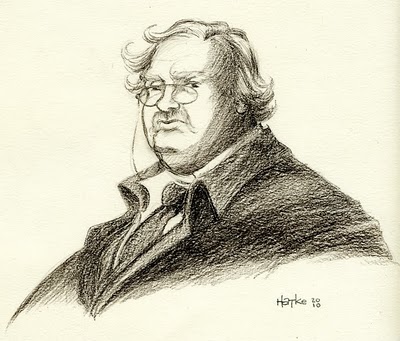 Andrew Thurston was the single attendee at last night's Chillicothe Chesterton Society Meeting. Andrew is always there because he works at Schlegel's on Wednesday nights. That means Andrew also won the membership to the American Chesterton Society. We didn't even have to draw names out of a hat! I'm not positive, but I think Andrew would attend the meetings even if he were not working. He has been reading the Chesterton books I've left at Schlegel's and has printed one off the Project Gutenberg web site.
Andrew Thurston was the single attendee at last night's Chillicothe Chesterton Society Meeting. Andrew is always there because he works at Schlegel's on Wednesday nights. That means Andrew also won the membership to the American Chesterton Society. We didn't even have to draw names out of a hat! I'm not positive, but I think Andrew would attend the meetings even if he were not working. He has been reading the Chesterton books I've left at Schlegel's and has printed one off the Project Gutenberg web site.Andrew also introduced me to Father Rick Terry, of the Chillicothe Anglican Fellowship (AMiA/Rwanda). Father Terry's church is just up the street from Schlegel's. (Father Terry had just stopped in for coffee) Father Terry and I talked a bit, he has read Orthodoxy, and I invited him to attend future Chesterton Society meetings if he has the time.
Before the meeting, I stopped in Book World, our local mom and pop book store. The Chesterton books they ordered in are still there. Unless there is a great rush to buy Chesterton books for Christmas presents, it would appear my library will be increasing some time in mid January.
And finally, I went Googling for "Chesterton on hope" and found this, from Heretics, Chapter XII, Paganism and Mr. Lowes Dickinson:
It is somewhat amusing, indeed, to notice the difference between the fate of these three paradoxes in the fashion of the modern mind. Charity is a fashionable virtue in our time; it is lit up by the gigantic firelight of Dickens. Hope is a fashionable virtue to-day; our attention has been arrested for it by the sudden and silver trumpet of Stevenson. But faith is unfashionable, and it is customary on every side to cast against it the fact that it is a paradox. Everybody mockingly repeats the famous childish definition that faith is “the power of believing that which we know to be untrue.” Yet it is not one atom more paradoxical than hope or charity. Charity is the power of defending that which we know to be indefensible. Hope is the power of being cheerful in circumstances which we know to be desperate. It is true that there is a state of hope which belongs to bright prospects and the morning; but that is not the virtue of hope. The virtue of hope exists only in earthquake and eclipse. It is true that there is a thing crudely called charity, which means charity to the deserving poor; but charity to the deserving is not charity at all, but justice. It is the undeserving who require it, and the ideal either does not exist at all, or exists wholly for them. For practical purposes it is at the hopeless moment that we require the hopeful man, and the virtue either does not exist at all, or begins to exist at that moment. Exactly at the instant when hope ceases to be reasonable it begins to be useful.







